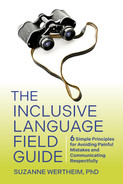The Inclusive Language Field Guide
 DISCUSSION GUIDE
DISCUSSION GUIDE 
DID YOU READ this book as part of a group? Here are some questions you can use to facilitate your discussion of the material—and your responses to it.
Please remember that everyone in your discussion group will have had different lived experiences and may have different flavors or indexicality for certain words. The more your group can listen in a gently curious and nonjudgmental way about everyone’s experiences with language, the better the conversation should go.
1. What’s the most surprising or unexpected or impactful thing you encountered in this book?
2. Can you remember a time when someone said something problematic or hurtful? What’s the story? What was the end result?
3. Can you remember a time when someone said something especially inclusive or welcoming? What’s the story? What was the end result?
4. How do you feel about the new twenty-first-century etiquette when it comes to language? What’s your personal relationship with it so far?
5. Do you have any skills or tricks you use for “regular event” planning that you can apply to “communication event” planning?
6. Is there one of the Six Principles of Inclusive Language that feels most relevant to your life? Which one, and why?
7. What do you think about the fact that professional is a word that can keep people out of jobs and promotions and workplaces because they aren’t white? Have you seen this play out yourself?
8. Have you ever seen the same behavior described in two different ways depending on who is doing it? Who ended up with the short end of the stick?
9. Have you ever seen someone who is reporting a problem dismissed as just being emotional? How did that play out?
10. Is there something that you wear or have hung on your walls that indexes (points to) a social meaning that someone could easily read? What would they learn about you?
11. Is there a word or song or food or location that has a different flavor for you than for other people? Do people try to convince you that their flavor is the right one?
12. What’s your experience with the words exotic, Oriental, articulate, and inspirational? What is their flavor for you?
13. Is there something about gender identity, gender presentation, or sexual orientation that feels new and like you don’t quite get it? What could you do to learn more?
14. What’s an example of inflating language or softening language that has really bothered you? How did it present reasonable behavior as unacceptable, or problematic behavior as just fine?
15. Can you think of examples of DARVO (Deny, Argue, and Reverse Victim and Offender) you’ve encountered in your own life?
16. Have you ever been part of or witnessed an unconscious demotion? How did that play out, and how do you feel about it now?
17. Do you, or any of your friends or colleagues, struggle with having your name said or spelled correctly? How does that feel? How about nicknames that people just drop on you without your permission?
18. What do you think about the ways the cycle of pejoration is related to social stigma and cultural attitudes? Do you think there’s a chance of changing things?
19. Have you ever been presumed incompetent? Or known someone who was? How did it play out? How did it feel?
20. Who are some groups you should probably learn more about so you can do a better job with that second step of perspective taking? How do you plan on doing it? Can you share resources with each other?
21. What’s your relationship with the original inhabitants of the territory where you currently live?
22. Do you know anyone who has had to deal with some kind of erasure? For example, perhaps their history got erased, or their sexual orientation, or their skin tone, or the difference between them and “the other one”?
23. Making inclusive language mistakes can feel embarrassing. Do you have a game plan for trying out new language despite the fact that you might make mistakes?
24. It’s common to have a defensive reaction to new information that goes against language myths (examples of language myths include some dialects are better than others; some languages are better than others; words have the same meaning for everyone). When you were reading the book, was there anything that just felt wrong? How do you feel about it now that you finished?
25. Do you have someone in your life you can rely on to give you honest (and constructive) feedback on your inclusive language use? How could you work with them?
26. How can you as a group support each other in a shift to more inclusive language moving forward?
